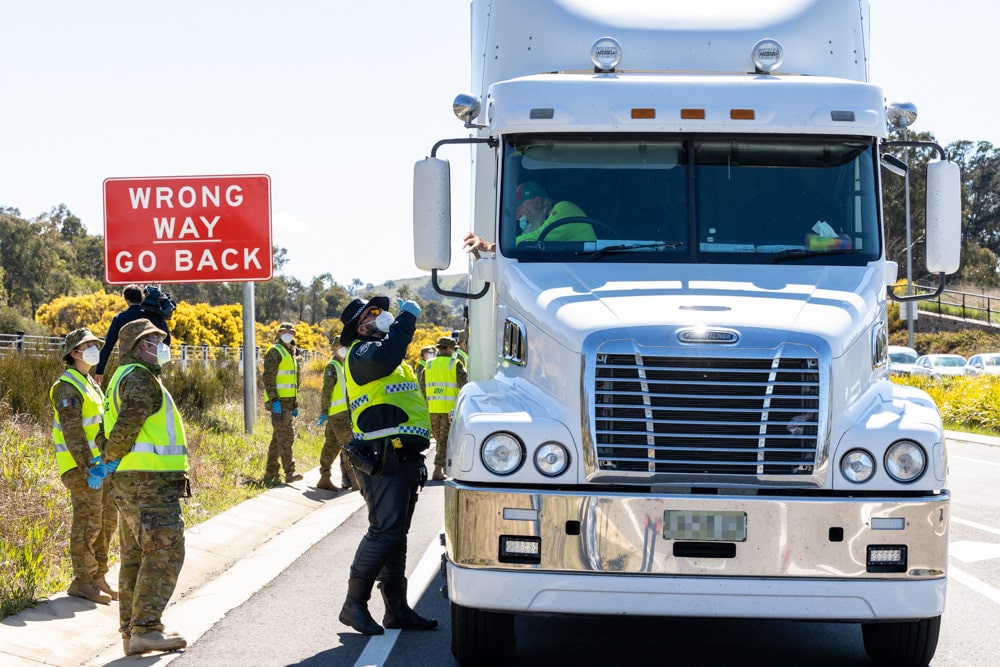The Australian Defence Force has been called in to help police stop people entering or leaving the ACT without a valid permit, in a further attempt to control the spread of COVID-19.
The ACT’s borders are closed to anyone without a health exemption, but cases of COVID-19 are still entering Canberra from NSW, authorities believe.
Since lockdown began in August, ACT Policing have conducted more than 23,000 vehicle compliance checks – and patrols have intensified since school holidays began last weekend.
As patrolling roads takes plenty of police manpower, ADF personnel will help pre-screen vehicles until the end of October.
The ADF will help police conduct more border operations, to ensure people comply with health directions restricting the movement of people across the border, said Detective Acting Superintendent Donna Hofmeier, ACT Road Policing.
The police will speak to the public and challenge drivers if they are not meant to come into the ACT, said. The ADF will make sure car occupants wear their masks and have their documents ready.
The ADF personnel do not supplant police, and have no police powers, Colonel John Brennan reassured the public; they will purely assist with marshalling, traffic management, and other general duties.
“This has been quite common throughout Australia,” Colonel Brennan said. “I’m sure that the ADF members here will be good ambassadors for the Australian Defence Force, and will provide useful assistance to ACT Policing.”
The 23 Defence members deployed come from the Federation Guard and other units stationed in Canberra, Colonel Brennan stated. He commands Joint Task Group 629.9, set up to help the ACT Government during the pandemic.
Since the pandemic began last March, the ADF has helped the ACT Government with contact tracing, quarantine management, and providing planners to ACT Health.
Supt Hofmeier said Defence’s help would keep the residents of the ACT and the border safe. “It is a great assistance to us and to our members.”
Chief Minister Andrew Barr announced last week that he had requested ADF assistance. Modelling suggests COVID-19 case numbers in NSW could grow to tens of thousands by Christmas. Mr Barr believes this would put pressure on the ACT hospital system, where a quarter of patients come from regional NSW. Should case numbers spike, border patrols would help to protect the ACT.
On Friday, Mr Barr announced that more than 4,000 vehicles had been stopped at border crossings, and 12 turned around. On Saturday, the first day of the public school holidays, more police patrolled major entry points to the ACT; Supt Hofmeier said several people were caught trying to enter the Territory through back roads and the Brindabellas.
In the past week, ACT Policing made 8,636 traffic compliance stops – most were made at border crossing points, but police can conduct compliance stops anywhere in the ACT at any time. Police directed 61 people to leave the ACT, and 306 more were ordered to move on, excluded from a particular location, and directed to return home.
“At the moment, our biggest threat is from the Federal Highway,” Supt Hofmeier said. “We will spend a significant amount of time [there] – but if we get intelligence [about] other borders, then you’re likely to see us pop up there as well.”
Only this morning, two vehicles were turned around on the Federal Highway: one a truck from Sydney without a COVID test, the other someone travelling into the ACT without a health exemption.
She acknowledged that some people had tried to do the right thing.
“We are seeing people becoming more educated, especially the freight workers,” she said. “They have their test [results] ready for us.”
Supt Hofmeier asked the ACT public to be patient, and to be aware that both ADF and ACT Policing patrolled major arterial roads. Some roads will be slower; City Services will set up speed signs and traffic cones.
The Canberra public should only travel if they need to; if they enter NSW, they should make sure they have the correct documentation to return to the ACT.
Details of fines for breaches of public health directions under COVID-19 can be found online at https://www.covid19.act.gov.au/act-status-and-response/act-public-health-directions
For more news:



